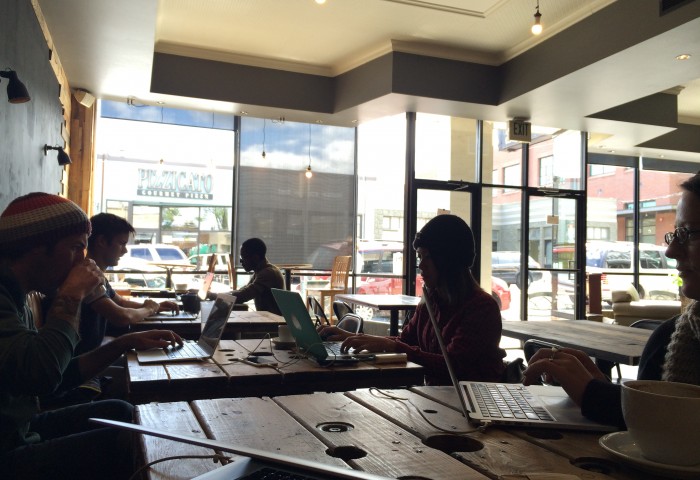A couple of years ago I just wanted to escape from Russia and find my place in the world. I didn’t even know what digital nomads were. And now I’m one of them, working remotely for an Italian PR company, living in different parts of the world and running the Digital Nomad Hub – a curated collection of resources for digital nomads.
I have a “normal” workweek, weekends, and everyday routines… The astronomical difference is that I live wherever I want, nomadically, and am able to bring my job with me–anywhere I can find WiFi.
I work in front of inspiring views–instead of a confined office with artificial lights. I sleep when I want and as much as I want, and it makes me super-productive for the rest of the day…or night. I choose when to work, when and whether to have a break, and I don’t depend on lunch boxes. This is what I call freedom.
Hopefully, my personal story will inspire someone–someone for whom hitting the road will be even easier than it was for me with my Russian passport and limited travel opportunities.
Back in 2013, I was living in Italy and didn’t see myself anywhere else. I was working for a Public Relations company, doing translations and social media marketing. So, speaking about location independence, my dream was small. Tiny. Instead of traveling the world, I simply wanted to move to another city and keep the job. Had anyone told me I would become a digital nomad–I would have sent them “back to the future”.
The action came unexpectedly. While visiting my dream town, I stayed overnight at a couch surfer’s home with a huge library. Book upon book clamored for my attention with seductive titles, including the “4 Hour Workweek” by Tim Ferriss. I had never heard of it by that time, nor about location independence, nor about the army of digital nomads hitting the roads of the world. I just liked the title, that’s all.
Who knew! I read it all overnight. The entire book.
The next morning I sent the first “action” email to my boss (taken from the book), and got a positive reply.
In a couple of months, after taking some well-thought, strategic steps from the book, I had a new contract from the company and a one-way ticket to my first location independent destination.
So what are the steps? There are just five, and I want you to see how they can be applied in your life – on my personal example.

Morocco, my home office.
(Note: in italics are excerpts from the original book, sometimes paraphrased for grammatical reasons.)
Step 1: Increase Investment.
Make your company invest in you as much as possible, so that the loss is greater if you quit. Take some courses or additional training that might be available for employees, and have the company pay for it.
In my case, the investment was measured by time rather than money, but both are relevant for the purpose.
When the company finally found the right position for me–after 6 months of do-it-all-work–it happened to be Social Media Marketing that I had had my leg into a bit, but still wasn’t an expert. They decided to teach me the skills, and they did it. They tolerated less workload while I was studying the new field by myself, too. They spent the precious office time on giving me those skills, and it would definitely be a big loss for them to fire me and teach someone else from the beginning.
More to that, I’d been working for that company for more than 6 months by that time and was familiar with all the clients, processes and procedures. It is always a pain in the neck for any company to let some stranger into the structure and wait until he becomes the real part of it.
Do not underestimate how much the company needs you!
Step 2: Prove Increased Output Offsite
Use a preplanned “emergency” like sickness or any personal issue that requires you to take a couple of days out of the office. After doing that, say that you prefer working from home rather than taking vacation days. Now, make these “off” days the most productive ever!
I simply did that. After a no-sleep night, overexcited with the new plan and a magic chance given to me, first thing in the morning I sent an email to my boss. For some “personal issues” I asked her permission to stay in another town for a couple of days while doing the same job as always.
Knowing my boss, I expected her to connect with my colleagues to get them to give me extra translation work for these days. I was more than ready for that: it was exactly what I needed according to 4HWW! My only job was to execute everything perfectly, even if it took me more time than usual.
During this experimental period, don’t feel sorry for yourself. You know what you’re doing it for. Work a lot, I really mean it!
Step 3: Prepare the Quantifiable Business Benefit
You need to create a bullet-point list of how much more you achieved outside the office with explanations (e.g. no commuting, fewer distractions, etc…)
I believe this must be a rather careful action. I really wouldn’t recommend pushing the whole thing through too quickly, scaring your boss with your real intentions.
So, reporting about everything done I didn’t emphasize any positive or negative factors. Just the report. Done, done, done.
Your boss is smart enough to understand that you’ve executed a double workload. You’ve done everything (s)he told you to do while not even being in the office. Tick!
Step 4: Propose a Revocable Trial Period
Suggest two or three days at home per week as a trial for two weeks, and make them ultraproductive. At the same time, your in-office hours must be the least productive of the week, you can even minimally drop in-office production and increase the contrast.
I asked my boss to be able to spend some days per week in another town while doing the same job. I suggested her trying this mode of working for as long as she felt comfortable for, and as soon as she didn’t consider this mode productive, we would stop it immediately, and I would come back to the office hours.
I guess, this step is the most difficult of all. It was not that difficult to pretend to be sick and stay at home for a day or two at Step 1, right? It will not be as hard to complete the whole thing when everything is already clear to you and your boss at the next step.
For now, you’ve already gone too far, and refusal might be painful at this time. But your fears do NOT increase your confidence! After all, you don’t lose anything. Just ask.
Step 5: Expand Remote Time
Ensure that your days outside of the office are your most productive to date. Show how great you feel with the change in routine, which definitely leads to better work in the future. Be prepared to suggest quitting if the boss refuses. Losing a valuable employee is less appealing to any company than arranging remote work.
And here it comes–the uncommon case of mine which, I wish, will inspire you for the better.
Going through the steps above, one by one, cherishing the dream of relocating to another town within the country, I had to face something very unexpected. My French residency permit was about to expire, and it was not possible to get an Italian one, even though I was working there. My Russian passport reminded me of itself: I had to leave the EU within 1 month time.
What a disappointment it was! I thought I had already found my place. I loved Italy with all my heart despite all the bureaucracy obstacles that it puts in front of an immigrant. I didn’t want to leave anywhere. I was literally crying and cursing my Russian passport…
But what a coincidence it also was that I still hardly believe! Who knows, whether I would have kept the job if not the relocating strategy taken before. I don’t think it would have been a good idea to ask the boss something like: “You know, my visa is expired. What if I keep on working for you from elsewhere via Internet?” However, after thoughtful actions, a trial period, productivity increase and impressive reports, a similar phrase sounds very different: “You see, I have to leave the country soon. However, I would be happy to keep on working for you remotely, just like we’ve been doing so far”.

Morocco, peaceful view beyond my laptop screen.
The answer was – Yes!
But, I have to admit, I cheated a bit. My boss and my colleagues thought I was coming back to Russia, while I was preparing the trip to Morocco. Some things are not necessary to reveal, I believe. Who cares where I am, and where you are–the job is done, and everyone is happy.
Now I keep on coming to Italy every now and then, but my company doesn’t always know about it. Sometimes I appear in the office, see the new faces, chat with the others, but as you may guess, this is not an obligation.
Between these Italian visits, I live where I feel like living at the moment–be it Morocco, the Philippines, or my parents’ house. As mentioned in the beginning–this is what I call Freedom.




Responses
This text is so inspiring. I was a little down for the day but after reading this my energy came back instantaneously.
Glad to hear you’re in better spirits! Victoria is amazing